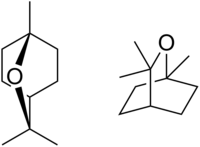Eucalyptol
 |
|||
|
|
|||
| Names | |||
|---|---|---|---|
|
IUPAC name
1,3,3-Trimethyl-2-oxabicyclo[2,2,2]octane
|
|||
| Other names
1,8-Cineole
1,8-Epoxy-p-menthane |
|||
| Identifiers | |||
|
470-82-6 |
|||
| 3D model (Jmol) | Interactive image | ||
| ChEMBL |
ChEMBL485259 |
||
| ChemSpider |
2656 |
||
| DrugBank |
DB03852 |
||
| ECHA InfoCard | 100.006.757 | ||
| 2464 | |||
| KEGG |
D04115 |
||
| PubChem | 2758 | ||
| UNII |
RV6J6604TK |
||
|
|||
|
|||
| Properties | |||
| C10H18O | |||
| Molar mass | 154.249 g/mol | ||
| Density | 0.9225 g/cm3 | ||
| Melting point | 1.5 °C (34.7 °F; 274.6 K) | ||
| Boiling point | 176 to 177 °C (349 to 351 °F; 449 to 450 K) | ||
| -116.3·10−6 cm3/mol | |||
| Pharmacology | |||
| R05CA13 (WHO) | |||
|
Except where otherwise noted, data are given for materials in their standard state (at 25 °C [77 °F], 100 kPa).
|
|||
|
|
|||
| Infobox references | |||
Eucalyptol is a natural organic compound that is a colorless liquid. It is a cyclic ether and a monoterpenoid.
Eucalyptol is also known by a variety of synonyms: 1,8-cineol, 1,8-cineole, cajeputol, 1,8-epoxy-p-menthane, 1,8-oxido-p-menthane, eucalyptol, eucalyptole, 1,3,3-trimethyl-2-oxabicyclo[2,2,2]octane, cineol, cineole.
In 1870, F. S. Cloez identified and ascribed the name eucalyptol to the dominant portion of Eucalyptus globulus oil.
Eucalyptol comprises up to 90 percent of the essential oil of some species of the generic product Eucalyptus oil, hence the common name of the compound. It is also found in camphor laurel, bay leaves, tea tree, mugwort, sweet basil, wormwood, rosemary, common sage, Cannabis sativa and other aromatic plant foliage. Eucalyptol with a purity from 99.6 to 99.8 percent can be obtained in large quantities by fractional distillation of eucalyptus oil.
Although it can be used internally as a flavoring and medicine ingredient at very low doses, typical of many essential oils (volatile oils), eucalyptol is toxic if ingested at higher than normal doses.
Eucalyptol has a fresh mint-like smell and a spicy, cooling taste. It is insoluble in water, but miscible with ether, ethanol, and chloroform. The boiling point is 176 °C and the flash point is 49 °C. Eucalyptol forms crystalline adducts with hydrohalic acids, o-cresol, resorcinol, and phosphoric acid. Formation of these adducts are useful for purification.
...
Wikipedia


